How to get more out of your time
| APRIL/MAY NEWSLETTER | Writing Prompts, FREE Writing Workshop & why we need to embrace our mortality
Dear reader, writer and fellow creative,
Thank you for allowing me into your inbox, and a special welcome to new subscribers!
It’s EIGHT YEARS this month since I started this newsletter from the living room floor of my rented house in Vietnam, where none of the tables and chairs fit my western dimensions. It was both exciting and (physically) uncomfortable.
A lot has changed since—for all of us—but some things never change. I am still excited to be sending my monthly writing prompts to nearly three thousand readers, and I remain uncomfortable doing it. Not physically—thanks to my comfortable standing desk—but because I have nothing new to say and I don’t want to waste your time.
Come to think of it, I have a lot to say about time! Since my most popular newsletters are often about things I need to learn, today I am going to tell you about my quest for better time-management and work-life-balance, and why that’s actually a waste of time.
Does it feel like time is always running out?
I don’t know about you, but every day I feel like I am running an unwinnable race against time, when, ironically, I have more time available than ever before. Regardless of how many productivity hacks I implement, how well I stick to my routine, I constantly feel like I should get more done, clear my inbox, get to the bottom of my to-do-list—which of course never happens.
There’s just never enough time to get on top of things and it’s making me anxious. Sound familiar?
This afternoon, as I was getting wound up about this newsletter being late, about wasting time scrolling for ideas, which led to wasting more time feeling guilty about my scrolling, I had a small epiphany.
What if I accept that I won’t ever be as organised and efficient as I’d like to be? (BTW, my reputation as a highly efficient German is completely undeserved, plus I have ADHD, which means my time management is in the hands of a toddler.)
What if I declare defeat now, accept that there will never be a time when I’ve ticked off every item on my to-do-list…because, like yours, mine is a bottom-less list.
What if I accept that time is a finite quantity and it’s up to me—you, each one of us—to carefully choose how to use it?
Just as I considered turning off my phone to finally start writing—because scrolling through social media is, as we all know, the most wasteful use of time—an interesting title popped up.
Four Thousand Weeks, Time Management for Mortals
by Oliver Burkeman (Penguin, 2021)
Turns out, Burkeman had the same epiphany as I did. And he’s written a bestseller about it.
Having written This Column Will Change Your Life, a popular, weekly column about happiness and productivity, for The Guardian for fourteen years, Oliver Burkeman is an expert in this stuff and he’s also a great writer. (Needless to say, I spent the next hour not writing my newsletter but reading his book.)
How many weeks do you think you’ll be alive?
Burkeman’s done the math. The average lifespan is four thousand weeks if you live to eighty. Accordingly, I’ve got exactly nine hundred and eighty-eight weeks left. That’s nine hundred and eighty-eight weekends, nine hundred and eighty-eight Mondays, almost a thousand Tuesdays, a quarter of life. But when you consider the days, entire weeks, I’ve wasted on Facebook and Instagram, it’ not that much at all.
Given my parents’ genes—my dad turns ninety this year, so he’s already had an additional five hundred and twenty weeks—I’m hoping to make it beyond eighty. Still, it’s a depressingly short time when you consider that time accelerates with age. Months feel like days, years like months, my dad tells me. This has to do with the fact that as we age, we have fewer new experiences, our lives are more routine, and our perception of the world is less vivid.
So, how do we get the most out of those four thousand weeks when we have so many dreams and aspirations, but there is so little time?
“We’ve been granted the mental capacities to make almost infinitely ambitious plans, yet practically no time at all to put them into action.” Oliver Burkeman



How to make the most of your four thousand weeks on earth?
It’s a question the ancient Greeks already asked. The problem, according to Oliver Burkeman, is our narrow-minded concept of time. We imagine time as something separate from us—a resource that we own and therefore can control. But by trying to control our time, we’ve allowed time to control us. The more we try to be efficient, the more rushed we feel.
Time management is an illusion, says Burkeman, productivity a trap, and nobody’s got a grip on their work-life balance.
The key to doing justice to the remarkable gift of those four thousand weeks IS NOT, Burkeman says, to do something remarkable with them, or become the master of your time, or cram in as much as possible, but to experience life as finite. To slow down and be curious about the infinite wonder contained within everyday moments.
“There is an alternative: the unfashionable but powerful notion of letting time use you, approaching life not as an opportunity to implement your predetermined plans for success but as a matter of responding to the needs of your place and your moment in history.” Oliver Burkeman
Stop wasting time trying to be productive
Here’s what works according to Burkeman:
accept your mortality and the finitude of life (focus on a few things at a time, and don’t start anything new until you finish something else; remind yourself, frequently, of your cosmic insignificance—at the end of the day, nobody will remember or care about you, so do what makes you happy NOW, don’t live for the future).
accept your limitations (you can’t do it all; pick one big project at a time, don’t start any new projects until you finish that one; remember that multitasking does not work).
anticipate your failures (since you can’t excel at everything, decide in advance what you’re going to fail at – Burkeman calls this ‘strategic underachievement’).
embrace imperfectionism (don’t waste time trying to get it right and don’t try to please everybody, you cant; done is better than perfect; remember, you are mortal and therefore intrinsically imperfect)
make intentional choices (prioritise things that matter, that bring joy and meaning; be selective).
speak to yourself like you would to a friend (being nice to yourself, allowing yourself to skip the gym when necessary, won’t result in you becoming lazy; you’re just doing the best you can; so be easy on yourself, don’t fight yourself).
find novelty in everyday moments (look at the world through the lens of beginner’s mind, find awe and wonder in what’s around you; do unplanned things, take up a hobby, go on a mystery walk, or do as I do, watch the clouds roll in).
do nothing (the present moment, NOW, is all you’ll ever get, so be present, don’t numb yourself by being busy; learn to do nothing; stop and watch the world go by).
make time for play (do things that you can enjoy right now, things that, unlike work, are not future-orientated; seek flow over focus).
“choose curiosity (wondering what might happen next) over worry (hoping that a certain specific thing will happen next, and fearing it might not) whenever you can.”
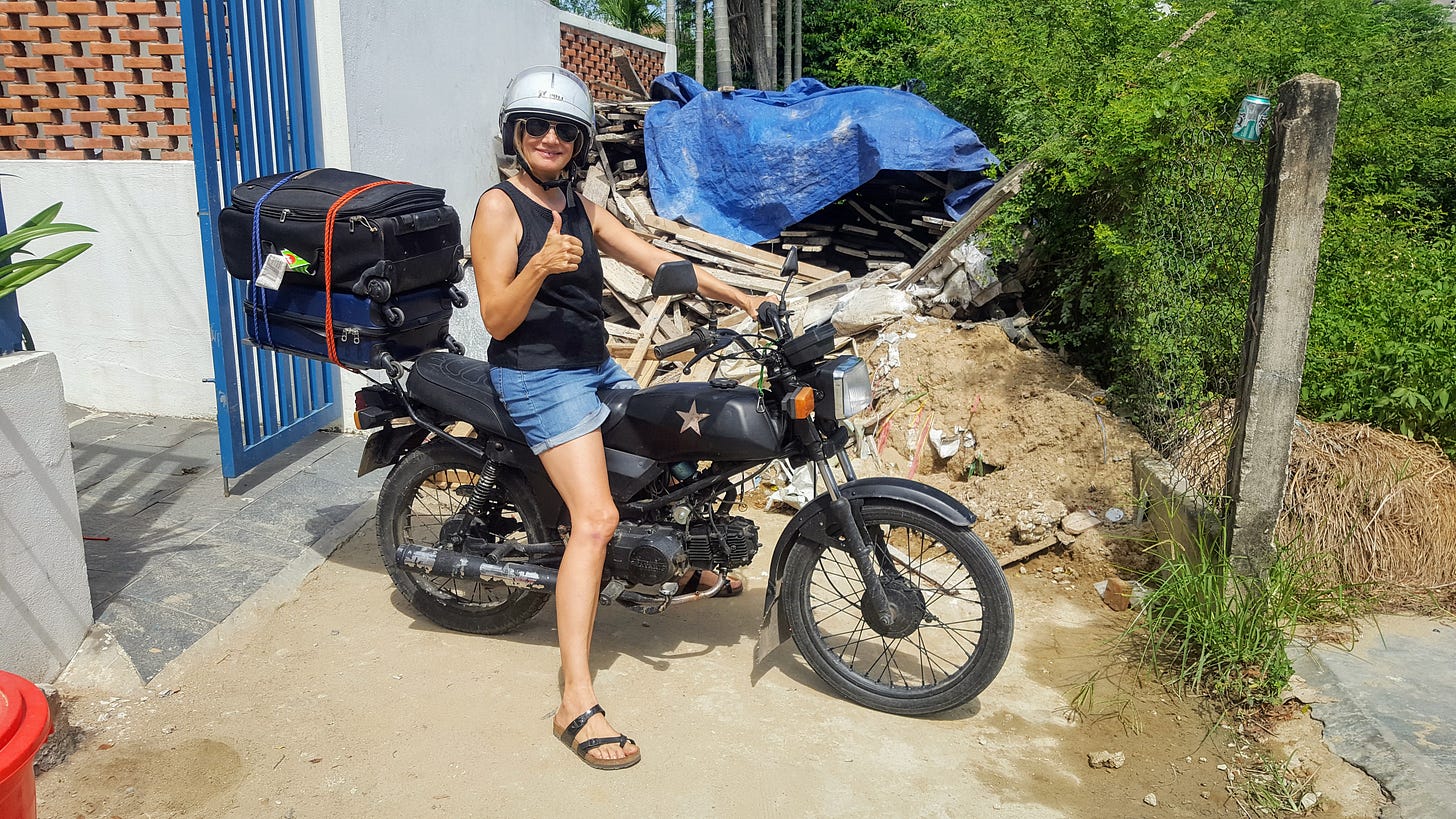
What has all of this got to do with writing?
Well, everything! Writing is often the last thing we make time for. I’d love to write a book, if only I had more time. How many times have you thought that? How many times have I heard it? (Read my tips on how to write when you don’t have time here).
One way to slow down time is by getting into the writing flow regularly—ie. by keeping a daily journal; writing Morning Pages; or as my writing pal Edwina does, by writing for 30 minutes every day to advance your book.
By consistently chipping away at your most important dream—to write—you are prioritising what matters most. Journaling challenges us to be imperfect and to bear witness to the wonder of the world. Loosing yourself in creative flow is one of the most exquisite ways to spend your time. So here are your (bi)monthly prompts.
“In order to most fully inhabit the only life you ever get, you have to refrain from using every spare hour for personal growth.” ― Oliver Burkeman
What does it take to fully inhabit the only life you’ll ever get? Set a timer for ten minutes and write without stopping.
Now do the math. How many weeks out of four thousand have you got left? What will you do with them? What will you not do? Write for another 10 minutes.
“Cosmic insignificance therapy is an invitation to face the truth about your irrelevance in the grand scheme of things. To embrace it, to whatever extent you can.” ― Oliver Burkeman
How do you feel about accepting your ‘cosmic insignificance’? Set a timer and write without stopping to think or edit. What does it mean to accept the finitude of your life?
“Attention, on the other hand, just is life: your experience of being alive consists of nothing other than the sum of everything to which you pay attention.” ― Oliver Burkeman
What will you pay attention to today?
What will you pay more attention to?
What will you pay less attention to?
Write for five minutes and share in the comments!
I always enjoy hearing from my readers, so don’t be shy! By leaving a comment, and by liking this post, you can help me make this newsletter more visible to other readers. And please share with anybody who might find it useful. Thank you in advance!
How about a Writing Holiday Under the Tuscan Sun?
Another effective way to slow down time and get into the creative flow, is by sneaking time away from your everyday life. Is it time you took yourself on a creative vacation? How about a writing holiday in Italy! We’ve got one deluxe double room left at our Incredible Italy Retreat, October 10-17, 2025. Bring a friend, or your partner, and enjoy a special discount! More info here, or hit reply on this email.


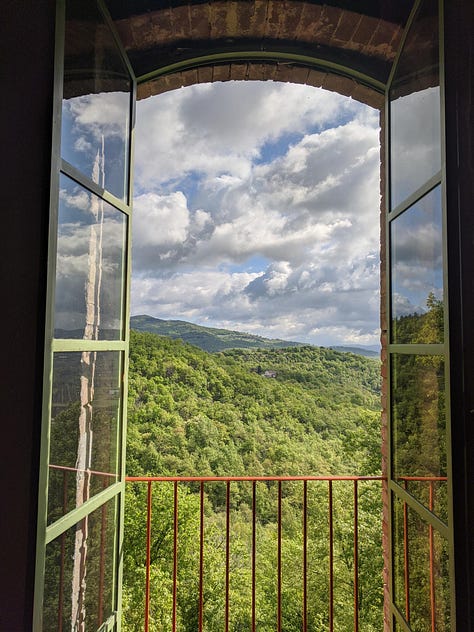
If you can’t join us this year, how about you pencil a retreat in now for next year? In 2026 we’ve got Blissful Bali (June 26 - July 2nd, 2026) & Beautiful Byron (19-26 September, 2026) on offer. Or join us for a FREE one-hour workshop on June 15th, 5pm AEST and learn how to write in scenes.
This was key for me. Once I understood that writing in scenes is essentially a way of showing, rather than telling, the structure of my memoir began to take shape. Let us help you write great scenes, and become a more confident writer!
If you’re in Australia, you can watch me speak about grief in this episode of SBS Insight, ‘Navigating Widowhood’ (available in Australia on SBS on demand). It was my first appearance on TV and it was an incredible experience. But I was disappointed that the focus of the show was on ‘dating after grief’, which meant the important parts of what I had to say about grief (as opposed to the click-bait part of my story) got cut.
Fortunately, I had a chance to elaborate in this first-person piece for the SBS website (read the article to find out what the pic of me with a holy man on the banks of the Ganges has to do with widowhood).



Finally, apologies to my regular readers for not sending this newsletter last month. I was inadvertently practising Burkeman’s tools—prioritising what mattered most, finishing the renovations of my apartment. Once the paint pots were gone from my living room, I prioritised settling into my new home and exploring my new neighborhood, on foot and on two wheels, all the while feeling anxious and guilty for not being productive. Now I realise that I was simply embracing the finitude of life, and we should never feel guilty about that!
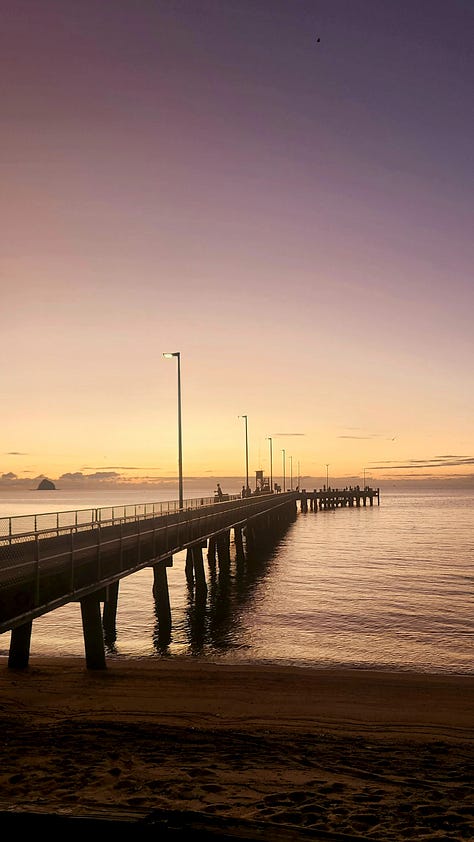
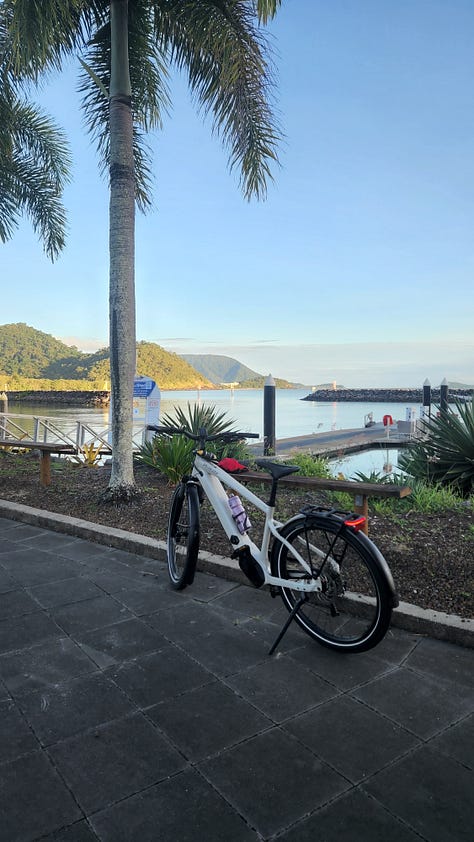
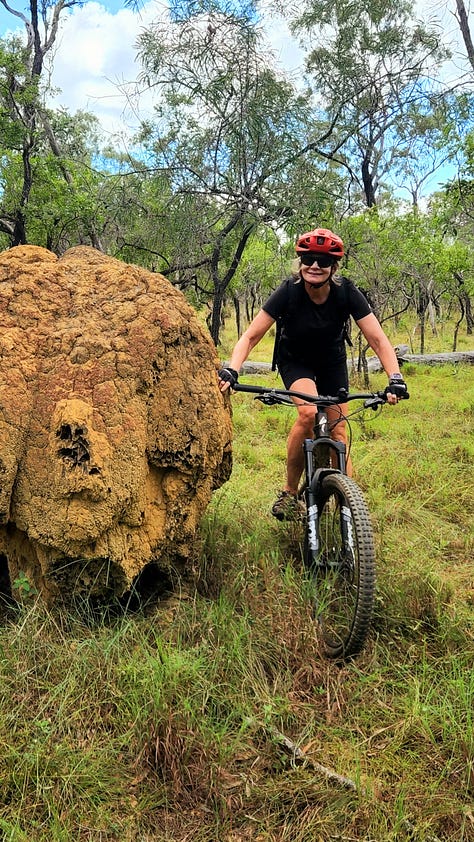
Rest assured, I plan to continue writing this newsletter monthly (to keep the pressure off, I am keeping it free for now).
I hope these writing prompts and tips have been useful and that you’ll find much wonder and awe in your day! And please share, comment and tick a like to help me make this newsletter more visible to other readers.
With many blessings,

















Just gorgeous Kerstin. Thank you. 🙏🏻
Great post honey. Time management. More time to stare at my garden :)